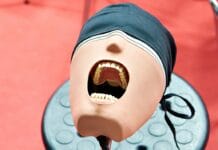It was May 2019. I had passed the NBDHE and both anesthesia exams and had graduated from an accredited dental hygiene program. The only thing standing between me and my professional license was the WREB Clinical Exam.
I walked into the school clinic just before 8:00 a.m. the morning of the exam with monster nervousness threatening to tear its way up from my gut. I thought to myself over and over, “I can do this.” But I didn’t. I failed. Twice.
Nothing I say, share, or advise will prepare anyone for the feeling of failing your clinical exam. I was the only clinician in my class who failed both attempts at the exam. The months following my failure were difficult. My self-confidence was shattered. I felt like a loser. My anxiety at the thought of having to drive to a different state to retest was often crippling.
Some days, it felt like I couldn’t catch a satisfying breath. In addition to all of this, life goes on, and I also went through a terrible breakup. My classmates all moved back to their homes, and I was feeling exceptionally lonely without them. You know that expression “When it rains, it pours?” I felt drenched in the gloom that had become my summer.
Bouncing Back
How did I get through? I had to keep my skills sharp, so I paid for a summer credit at my graduating college and used the school’s liability insurance to continue practicing. The school also set up an externship through the community health clinic so I could get even more practice.
The extra practice at the community health clinic was extremely beneficial because I was exposed to many patients requiring non-surgical periodontal therapy. I treated so many patients with advanced periodontitis and heavy calculus deposits that I truly felt my skills improve beyond the level I had achieved in school.
The August weekend came, and my patient and I drove to Boise, Idaho, for the WREB exam. I was nervous the whole time. “Do I have my loupes? Did I bring all of my instruments? I hope the ultrasonic I’m bringing works.” My brain wouldn’t shut up with all the nervous questions I asked myself.
The morning of the exam was like a blur. I worked so hard I was sweating, my hands were shaking, and I broke an instrument while scaling.
It was the fastest two hours and 15 minutes of my life. The wait for the “Golden Ticket” was excruciating, and I felt the familiar tumble of insecurity in my gut. When I finally got my envelope, I was relieved and excited to see I had passed. It was all worth it. I finally felt rewarded for my struggles.
Stay Focused Despite the Failure
Here are my suggestions if you are in the same scenario as I was:
- Trust your training and believe in yourself.
- Use your connections and resources, and ask for help.
- Use a classmate’s passing patient so the patient’s probe depths, calculus deposits, etc., are more likely to qualify.
- Continue practicing, even if it sucks to have to pay for another college credit, or even if it’s embarrassing to have to return to clinic. Just do it.
- If you have any questions or concerns, don’t hesitate to reach out to the clinic director of the location you’ll be visiting.
- Identify the causes of your previous failure: self-reflect and self-critique.
- Tackle some serious calculus and perio. The more difficult the patient, the better the practice.
- If you’re unsure about your selected board patient, keep looking and either find someone who you’re more comfortable with or keep them as a backup. You need to trust your gut.
My failure the first two times was a result of poor patient selection coupled with a very exhausting day. The board exams are difficult. Someone has to be the statistic, and if it’s you, don’t fret. I had A’s in clinic my entire senior year and still failed the exam. After I passed the clinical exam in Boise, my released grade was so high it shocked me. Rocking that third attempt really slapped me back to reality and helped me conceptualize that I am a great clinician and I had the skills to pass the first two times. I won my confidence back.
The truth is that sometimes, the clinical exams do not accurately display clinical skills, and sometimes, student clinicians get dealt a crummy hand. It’s unfortunate, but it’s the reality of testing that’s dependent on patient selection. I don’t wish this extra hurdle and stress on anyone. But if you find yourself at this point, I promise you can make it through, and you’ll come out at least twice the clinician you were before.
In Closing
I want to end on a high note and share my own “everything happens for a reason” story. Remember that community health clinic that let me practice? Months later, they received additional funding to hire a new dental hygienist and contacted me. I applied, interviewed, and snagged the job.
I also have so much in common with the patient I took to Boise, and we would have never discovered our similarities if it hadn’t been for our sixteen hours in the car together. Now he’s someone I consider a really close and special friend.
It all came full circle for me and it will for you, too.
Before you leave, check out the Today’s RDH self-study CE courses. All courses are peer-reviewed and non-sponsored to focus solely on high-quality education. Click here now.












